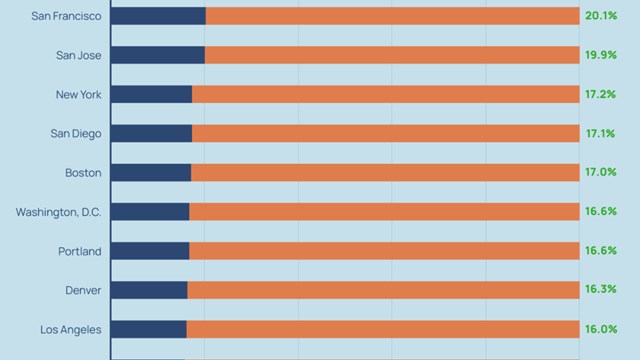As the 2012 federal legislative fiasco over the debt ceiling—as well as any number of other spending bills proposed since then—demonstrated, balancing a budget can be like pulling teeth. Balancing a condo or HOA community's budget can sometimes seem just as arduous—the task can be incredibly difficult because there are so many moving parts. Making sure that a building or association isn’t wasting money is even harder but budgeting a necessary part of running and managing a building.
In the case of a co-op, a condo or an HOA, cutting costs is one sure way to bring a runaway budget under control but cost-cutting comes with, well, costs. Cut too deep, and not only may a board face backlash from residents if services and amenities are reduced, but they may find themselves in an even tougher spot if maintenance issues are left unaddressed and lead to bigger expenses down the road.
There are ways that co-op, condo and HOA administrators can reduce waste and save money without neglecting necessary maintenance and services, however––it's just a matter of working smarter and consulting the right professionals.
Trimming Smart
According to the pros, the first thing to do when taking a critical look at cost-cutting is to make sure that your building is getting the best prices from the various companies and vendors you do business with. This is most effectively achieved by soliciting a minimum of three bids for any given contract, says Bruce Feldman, a partner with Feldman Sablosky Massoni & Co. based in Monroe Township, which handles accounting, auditing, taxes and advisory services for more than 250 communities including several in New York City.
But, he says, while condo boards should always look for inexpensive options, they should always make sure those options are the best ones—or else they will be spending a little today to spend more later. “I emphasize that the cheapest isn’t always the best,” Feldman says. “One has to do some research with regard to vendors—especially with the vendors who do repairs.”
Also, the professionals stress the importance of comparing 'apples to apples' when considering competing bids from different vendors, and making sure that the firms bidding on a given job are, in fact, experienced and qualified to do that particular type of work. If you get two bids on a painting job from two full-time painting contractors and one (much lower) bid from a plumber who does some painting work here and there on the side, keep in mind that if you go with the lowest bid, you'll very likely get what you pay for. Also, you may wind up having to hire one of the full-time painters anyway to come fix a botched job. “There are a lot of horror stories,” Feldman says. “You need to hire someone who has experience in the industry, and who has a proven track record.”
“My recommendation is to trust your managing agent to bring reliable, competent, reasonably priced contractors to do the job,” says Martin S. Kera, president of Bren Management Corp. in New York City. “Price should not be the sole consideration. You want good work at a reliable price performed quickly. Some boards may respond that they don’t trust their managing agent to do this. My response is they should hire a new managing agent in whom they have confidence.”
It's also crucial for boards to remember that they have a fiduciary duty to make sound decisions on behalf of their communities. “Boards and owners tend to value cosmetics more that structures and infrastructure,” Kera continues. “Decorating the lobby and the halls often takes priority over fixing the roof. Or board members tend to vote their personal, rather than building interests. ‘I want the halls to look good, because I intend to sell or lease my apartment,’ is a common comment. Things like waterproofing are often put off—and the longer the board waits to make the repair, the worse the damage becomes. The repair is more expensive, and maybe there are mold issues, and even legal action by an owner against the co-op or condo, and the board has to spend money fixing the damage that the leak caused inside apartments. This is a major issue. Making a patch, or Band-aid repairs to the roof is also common and a waste of money. If you add the cost of the repairs over 5 to 7 years, you have paid for a new roof—yet you still have to install a new roof.”
Conserve Your Energy
One huge area where condo buildings can save money is in energy investment projects, says Barry Korn, managing director of Barrett Green Management, which facilitates, consults and implements energy efficiency projects mainly in New York, New Jersey and Connecticut.
“Part of the reason that buildings don’t consider these projects is because they don’t think they have the money to spend on them,” Korn says. “But financing options are available to provide no upfront cost programs, and the savings pay for the costs.”
Of these kinds of programs, one of the biggest is master metering. Even when buildings have meters billed to individual units, there are savings when co-ops and condos have the tariff differential between the rate that an individual owner would pay and the rate that the building would pay as a bulk purchaser, Korn says. “You have the opportunity to go out for competitive bids for electricity,” Korn says. “There are two parts of your Con Ed bill—a part that is related to distribution that controls the lines, and the other part is the supply of the electricity.”
Energy in New York has been deregulated since the late 1990s. There are third party providers that go through the Con Ed lines, and while it may not be economically sensible for an individual to switch—when you do it at the building level, the savings can add up. Korn estimates that a building can save between 25 and 30 percent or more through master metering, depending on the setup of the building. For more information on choosing an energy service company or ESCO, go to www.newyorkpowertochoose.com.
In buildings where electricity is included—and some unit owners abuse this and leave the air-conditioning running—putting in a smart meter system helps to lower the bills, Korn recommends. For example, lighting bills can be lowered with occupancy sensors.
“In the common area, you put in lighting sensors because you don’t have to keep the lights on 24/7,” he says. “Those are substantial savings. We have experts who are able to understand the different issues and bring in the appropriate engineers. We’re able to implement this and to oversee the competitive bidding process, and to work with the property manager to get the best resolution.”
Other Likely Suspects
Energy efficiency isn’t the only place to save money; insurance is another big one. If your building is considering putting in an insurance claim, Feldman advises you to think twice. A history peppered with frequent claims can result in increased premiums or even outright cancellation of coverage—so carefully consider whether or not to run to the insurance company if some mishap occurs and your board or association is on the hook for only modest damages.
“You can shop the insurance periodically but you will probably not save much unless there are extenuating circumstances that caused the expiring policy to be higher,” adds Kera. “Extenuating circumstances are too many claims, a fire or storm damage, or violations that are difficult to remove.”
Keep track of your capital repair projects and only defer those that are deemed to be unnecessary. “When an association is doing a pet project—especially when it comes to landscaping, you have to look at your budget and see if you have the excess funds that year to do it,” Feldman says. “You shouldn’t just spend money if you’re already in the red, especially in 2014 when you’re already well over your budget.”
Other Ways to Make Money
In addition to finding ways to save money, there are also ways that a condo can make extra money. For example, if your building has a party room or a clubhouse, consider renting it out for outside events as that may be a potential revenue stream. Before you do that however, you must factor in costs, such as extra utilities for leaving the clubhouse lights on, plus heat and air-conditioning, and any additional liabilities that come with renting it out, Feldman says.
Another potential revenue stream, according to Feldman, is renting out roof space to cable television or wireless/satellite providers for cellphone towers or dish antenna installation. That is one way to make extra money, he says.
One move the professionals caution condo boards against doing is to unilaterally scale back or even eliminate amenities—even if few residents seem to be making use of them.
“Even though next to no one may be using it, you still have to keep the pool open,” Feldman says, and advises boards considering such a move to “check with your legal counsel, because those amenities are usually being offered when units are being sold or rented, and you can’t just take them away when you’ve already offered them to someone as part of the sale.”
Communicate and Participate
The most important thing to consider in all these cases are the wants and needs of your residents—and balancing those needs with the ability to pay for them. The litany repeated across the board is that transparency through regular communication and open meetings is imperative when it comes to proposing and implementing money-saving measures. Additionally, a proactive board should be constantly brainstorming with its management company and financial advisors to figure out other ways the community can save money.
Board members should also make a point of getting to know as many unit owners as possible because often those owners will have something of value to offer to the building that can be done at little to no cost—which can save a lot of money for everyone.
“For example, in several of our client communities, volunteer members purchase and plant annuals under the direction of a landscaping committee,” says Karen Sackstein, CPA, who has her own accounting practice covering the greater New York area. Not only does this save several thousand dollars a year in landscaper's fees, but it offers an opportunity for association members to have fun, get to know their neighbors, and collaborate in the beautification of their own community.
In the final analysis, some buildings need more amenities and more costly features, while other can do away with some and can even make money by monetizing their amenity assets—it’s all about working together and figuring out what makes sense for each individual building or association.
In the end, saving money doesn't have to involve enormous sacrifices or death-defying feats of accounting skill—it can be as simple as taking a good hard look at your books, paying attention, and asking yourself and your board if you can work a little smarter to stay in the black.
Danielle Braff is a freelance writer and a frequent contributor to The Cooperator. Staff writer Christy Smith-Sloman contributed to this article.







Leave a Comment